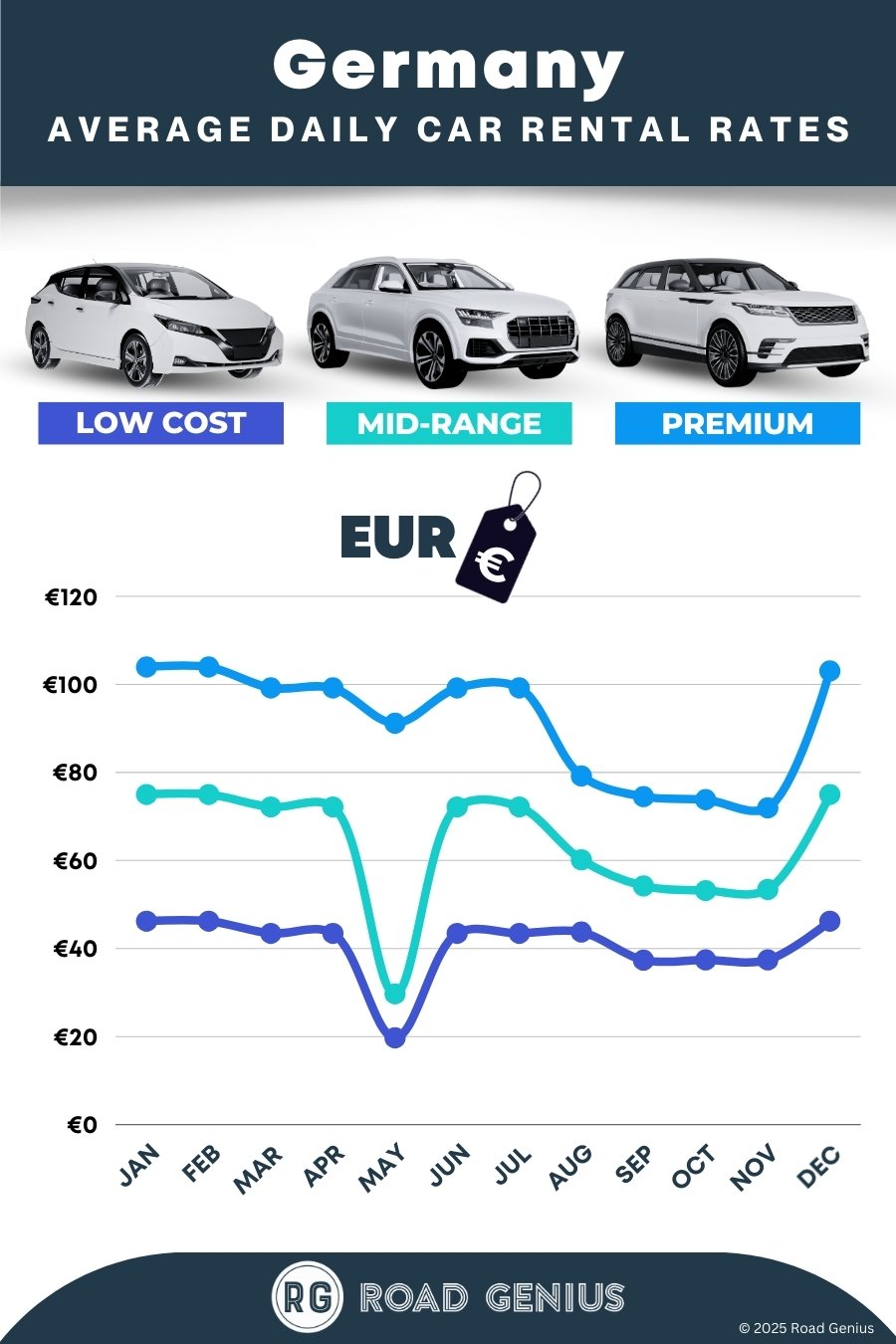






Find low rental car prices in Germany with Road Genius. Find rates for SUVs, hatchbacks and minivans and reserve with no booking fees. Compare car rentals from multiple brands at Frankfurt, Munich and Berlin airports, plus city and suburban depots nationwide. Book 4 to 6 weeks ahead for summer and automatic cars and check options for winter tires, cross-border trips and one-way rentals.
| Location Type | Pros | Cons |
|---|---|---|
| Major Airports (Frankfurt FRA, Munich MUC, Berlin BER) | • On-site rental centers with multiple providers • Extended hours (some 24/7) • Immediate highway access • Convenient for international arrivals |
• Airport surcharge (10-15%) • Busy at peak times, causing possible delays • Navigating unfamiliar traffic when leaving |
| City Centers (Train stations, city centers) | • No airport surcharge • Ideal if exploring the city first via public transit • Often near central train stations |
• Shorter operating hours • Immediate city traffic to navigate • Often requires travel from the airport to pick up • Smaller selection of vehicles at some locations |
| Suburban Locations | • Often lower rates • Less traffic congestion when starting your journey • Easier parking for pickup and return |
• Limited hours (often closed Sundays) • May require travel to reach • Fewer luxury or specialty vehicle options |
On average, car rentals in Germany cost around €65 per day, with the lowest-priced rentals available from €20 per day.
Compare pickup spots: City centre or suburban locations in Germany often avoid the 10-15% airport surcharge. Check opening hours and selection before you choose.
Time your booking to the season: For summer and Christmas, compare and book 4-6 weeks ahead. In Jan–Mar, 2-3 weeks out can be cheaper with good availability.
Tweak pickup/return times: Match the clock to avoid paying an extra day. If possible, avoid after-hours pickup to skip roughly €50 in fees.
Compare transmission and size: Manuals are cheaper. Automatics add ~€10-15/day and sell out in peak months, so secure early if you need one. Compacts park easier in German cities.
Skip pricey add-ons: Extra driver €5-10/day, GPS €8-15/day. Use your phone for navigation and only add drivers you’ll actually use.
Cut running costs: For long trips, compare a diesel. Use Clever Tanken to find cheaper fuel and refuel in the evening (6-8 PM). For big cities, use P+R lots near S-Bahn/U-Bahn for about €1-2/day instead of city-centre parking.

| Location | Common Cost (Approx.) | Tips |
|---|---|---|
| City Centers | Varies by city and location | • Use car parks ("Parkhaus") in major cities • Look for "P" signs that have digital displays showing available spaces • Payment usually via machine before returning to car |
| Street Parking | Varies; check local signage and meters or apps | • Blue "P" sign indicates permitted areas • Numbers like "8-20" show payable hours (8am-8pm) • Many cities offer payment via apps |
| Park & Ride | Often low-cost or free, varies by location | • Located near S-Bahn/U-Bahn stations on city outskirts • A good option for visiting city centers • Look for "P+R" signs on approach routes |
| Tourist Areas | Varies by attraction and season | • Often large designated lots near attractions • May fill early during peak season • Some scenic spots have time limits to increase turnover |
Germany has no general road tolls for passenger cars on Autobahnen or highways. Only a few specific infrastructure pieces have tolls:
Rhine Valley – Rüdesheim, Bacharach, St. Goar
Black Forest (B500 Schwarzwaldhochstraße) – Baden-Baden, Mummelsee
Bavarian Castles – Neuschwanstein, Linderhof Palace
Baltic Coast – Lübeck, Timmendorfer Strand, Rügen
Berlin–Munich corridor – Nuremberg, Leipzig, Bayreuth
Neighboring countries – Austria, France, Switzerland, Czech Republic

What documents do I need to rent a car in Germany? You will need a valid driver's license, your passport and a credit card in your name. If your license isn't in English or German, we recommend getting an International Driving Permit. Non-EU licenses are valid for up to 6 months.
Do I need an International Driving Permit in Germany? If your license isn't in German or doesn't use the Latin alphabet, many rental companies will ask for an IDP or an official translation. We strongly recommend you get one.
Are there age restrictions for renting in Germany? You usually need to be at least 21 years old. Rental companies will add a 'young driver' fee of about €10-25 per day if you're under 25. They also usually won't let drivers aged 21-24 rent premium cars.
Can I take a rental car from Germany to neighboring countries? Yes, most rental companies will let you drive to Western European countries for no extra charge. If you plan to travel to Eastern Europe, you may have to pay a fee of around €5-10 per day. Always tell the company which countries you plan to visit when you pick up the car.
What about zero-deductible insurance? Your rental usually includes basic insurance (CDW), but you will have to pay an excess of about €500-1,000 if there's damage. You can pay the rental company about €10-20 per day to reduce or remove this excess. Your personal credit card might also offer cover, but you should check if it's valid for the rental company's excess.
How do I handle the environmental zones in German cities? Your rental car will have the required green emissions sticker (Umweltplakette) on the windscreen. You need this for the restricted zones in major cities like Berlin, Munich, Frankfurt and Cologne.
What's the speed limit on the Autobahn? While some sections have no posted limit, the recommended speed is 130 km/h (81 mph). Many parts have fixed or changing limits, usually 120 km/h (75 mph) near cities or 80-100 km/h (50-62 mph) in work zones. Speed cameras strictly enforce these limits.
Do I need to pay tolls in Germany? You don't need to pay tolls for most highways in Germany. You only pay for a few specific tunnels or bridges. However, if you drive to neighboring countries like Austria and Switzerland, you will need to buy a toll sticker called a vignette.
What's the best vehicle type for touring Germany? If you're driving in cities, a compact car (like a VW Golf) is best for narrow streets and parking. For long distances on the Autobahn, a midsize sedan or wagon gives you more stability and comfort. If you plan to visit the Black Forest or the Alps, we suggest a car with strong pulling power (like a diesel) for the mountain roads.
How widely available are automatic transmission vehicles? You can rent automatic cars, but they are less common than manuals. They usually cost about €10-15 more per day. You should book one well in advance, especially if you're traveling in the busy season.